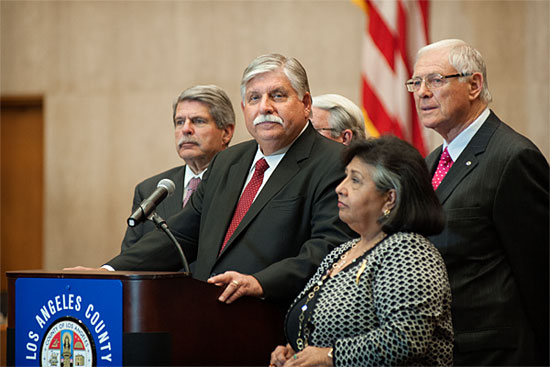Some straight talk from new sheriff
January 29, 2014

Interim Los Angeles County Sheriff John Scott (center) is flanked by supervisors as he meets the press.
After 36 years on the Los Angeles County Sheriff’s Department—with jobs ranging from street patrol in Lakewood to overseeing the country’s largest jail system—John Scott did not like what he was seeing.
“I thought the direction of the department was taking a turn that I did not want to be part of,” Scott recalled. “I saw diminished accountability. I saw fragmentation within the department. I saw some people who did not represent the best interests of the department.”
Scott said he felt “an obligation to talk to the sheriff.” But after voicing his concerns, he said he did not believe he had the support he needed “to fight the good fight.” So in March of 2005, he retired.
But on Tuesday afternoon, nearly nine years later, he was back, standing before a bank of TV cameras in the downtown Hall of Administration. He was flanked by members of the Board of Supervisors, who had just selected him as the department’s interim sheriff. His mandate: to keep the troubled agency moving swiftly toward reform until the election of a new sheriff either in the June primary or November runoff.
Scott will replace Sheriff Lee Baca, who officially retires on Thursday at noon. Baca’s departure comes after more than two years of steady controversy that eroded the agency’s reputation, including the recent indictments of 18 current and former members of the department for alleged brutality in the jails and obstruction of justice.
With no incumbent on the ballot, the race to succeed Baca has turned into one of the most heavily contested in the department’s recent history. At the same time, Baca’s unexpected retirement put enormous pressure on the Board of Supervisors to find an interim sheriff who would aggressivelyimplement reforms recommended in 2012 by the blue-ribbon Citizen’s Commission on Jail Violence. “We didn’t want a caretaker,” said Supervisor Zev Yaroslavsky. “And we didn’t want someone distracted by campaigning for the job.”
Scott seemed to be a good fit on both counts.
Besides his years of service in Los Angeles, Scott has spent the past 5 years as the undersheriff in Orange County. There, he has helped the agency recover from a sensational corruption scandal involving ex-Sheriff Michael Carona, who ended up in federal prison for witness tampering. Scott was recruited by Carona’s successor, Sandra Hutchens, a former division chief in the Los Angeles County Sheriff’s Department. (Scott, who is taking a leave of absence from his Orange County post, will return there after Baca’s replacement is sworn in.)
In an interview Wednesday with a writer for Supervisor Yaroslavsky’s website, Scott said his first—and top—priority will be to make sure everyone on the command staff is “in alignment” with the mission of bringing substantive reform and accountability to the department so they can effectively communicate it throughout the organization.
“I need to know that I have their complete buy-in,” he said. “If I don’t, then there’s going to be changes. I’m not bashful about that.”
Scott said he’s optimistic that changes in policy and direction can come quickly. But he said he’s realistic about the deeper cultural changes. “That’s a time-tested kind of process,” he said. “It’s like turning that big aircraft carrier.”
In Orange County, he said, some members of the department who resisted change ended up leaving the department because “it was heading down a different path—not one they chose. What you’re left with are people who have bought in.” He said he suspects the same thing could happen in Los Angeles.
For help in his new job, Scott has turned to a former colleague, retired Field Operations Chief Neal Tyler, who’ll return as an executive officer.
“I need immediate assistance from someone I know and trust,” Scott said of Tyler, who oversaw operations in Malibu/Lost Hills, Crescenta Valley, Altadena and Lancaster, among other places. Scott said that Tyler, like him, “had a great deal of difficulty with things that were going on.” Tyler left the department about a year ago, Scott said.
Scott said one of the challenges they’ll face is keeping the political race for sheriff from creating divisions and distractions in the rank and file. The current field includes two high-ranking insiders, as well as two former members of the department who’ve maintained alliances on the force. He said he will make it clear to the two inside candidates that “the operation of the Sheriff’s Department is Priority One and that their campaigns are on their own time…The mission is what we need to focus on, not the candidates. We need to keep this ship righted.”
On a personal level, Scott said his wife, Alice, strongly supports his return to the department so he can finally press ahead with the reforms he wanted to initiate before he felt compelled to leave. She’s a former sheriff’s captain, who retired in 2010, and, like him, did not like what she saw.
“She is one of those who watched internally and then from a distance and felt very disappointed and frustrated,” Scott said, adding: “I want to bring back the department’s premiere status.”
Posted 1/30/14












 405 bridge work causes a stink
405 bridge work causes a stink
